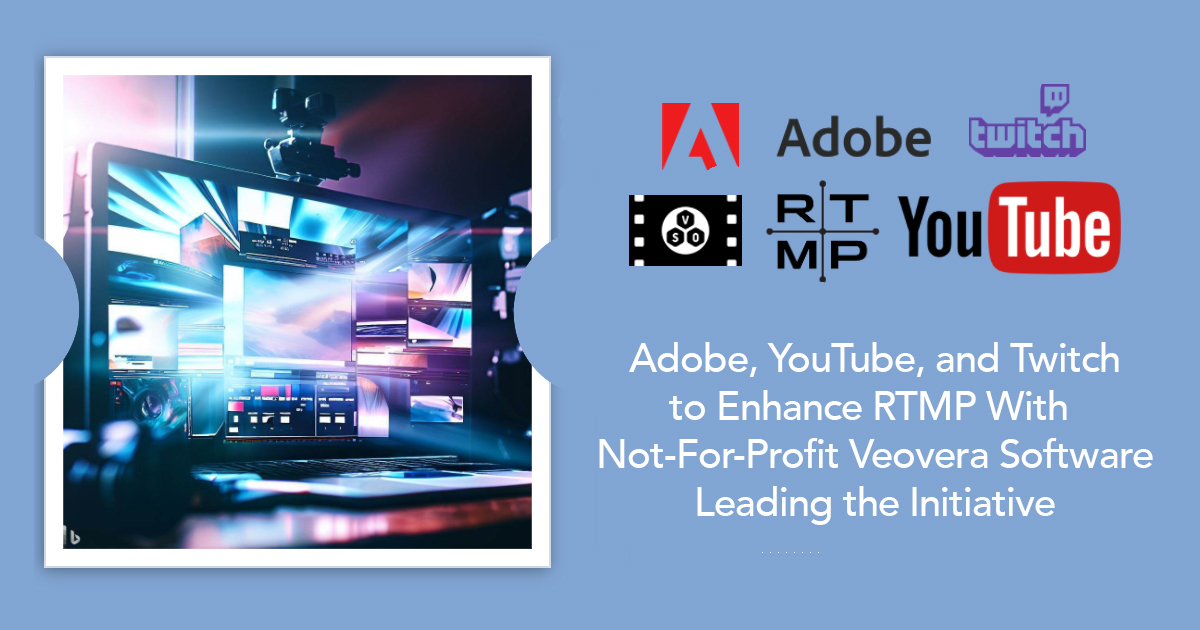Adobe, YouTube, and Twitch to Enhance RTMP With Not-For-Profit Veovera Software Leading the Initiative
Veovera Software, a not-for-profit organization, has stepped forward to spearhead the mission of modernizing RTMP, aligning its specification with the latest state-of-the-art technology. With the support of Adobe, a member of the organization, Veovera’s current focus is to steward and modernize the RTMP specification. YouTube and Twitch, also members of the organization, are backing the objective of enhancing RTMP. (Link to specs here)
RTMP was initially developed by Macromedia as a TCP-based protocol for high-speed transmission of audio, video, and data between servers and Flash players. It became the de facto standard for web-based streaming video as a crucial component of Flash Video. While RTMP died as a delivery protocol, RTMP continues to be a dominant force, especially on the ingestion side. Many broadcasting platforms incorporate this protocol into their processes due to its speed and reliability, characteristics that are particularly vital for first-mile delivery.
Slavik Lozben, Chairman of Veovera and one of the original creators of RTMP, told me that, “RTMP remains the most widely used format for live broadcast, with over 75% of broadcasters relying on it for ingestion. (According to Wowza’s Video Streaming Latency Report from 2021) Surprisingly, the next most popular technology accounts for less than a third of this usage. What’s remarkable is that RTMP hasn’t been updated in over 10 years. Given the escalating demands of the streaming community, it’s clear that RTMP needs enhancements to meet present-day challenges.”
RTMP has not been updated in over a decade, causing challenges related to not having the latest tech (e.g. support for current codecs, HDR). Companies that rely on RTMP now face a pivotal decision: should they invest in a costly overhaul or continue to utilize this increasingly outdated technology? Enhancing RTMP specification is a more manageable task compared to investing in an expensive transition to a different protocol.
Twenty-one years later, it’s astonishing to witness RTMP retaining its relevance after its original introduction in Flash Video. As an initial step, Veovera has incorporated support for AV1, VP9, and HEVC and is now striving to quickly define additional capabilities. Their goal is to continuously refine RTMP while ensuring backwards compatibility, without disrupting the internet or current tools. RTMP has remained untouched for quite a while, likely due to the absence of an organization willing to lead the effort to formally align the protocol within the industry. The challenges are not just technical but also involve logistical aspects. Veovera aims to:
- Prevent protocol bifurcation and maintain RTMP as a single, unified definition
- Enhance and modernize the RTMP/FLV specification with new functionality
- Collaborate with organization members and third-party solution providers to help deliver implementations that support the enhanced RTMP specifications
- Engage with the RTMP community to promote RTMP enhancements
Veovera says there’s a significant demand for this initiative across the industry and solution providers who rely on RTMP are eager to see these enhancements become a reality. Despite being in existence for many years, RTMP has remained relevant. Any longstanding streaming service has likely utilized RTMP at some point. Today, platforms and services such as Google, YouTube, Twitch, PlayStation, Meta, OBS, FFmpeg, VideoLAN, TikTok, and others continue to incorporate RTMP in their workflow.
Veovera has enhanced the RTMP specification by introducing popular video codecs like VP9, HEVC, and AV1. As for their 2023 roadmap, Veovera has a goal to enhance the recent video codec updates with the inclusion of widely-used audio codecs. The top contenders for this integration are Opus, FLAC, AC-3, and E-AC-3. Furthermore, Veovera intends to specify more features for RTMP, such as support for a seamless reconnect command plus other capabilities. Considering these enhancements, we can anticipate content to have lower latency and better quality. As a result, it’s plausible that RTMP will continue to stay relevant for many years to come.

